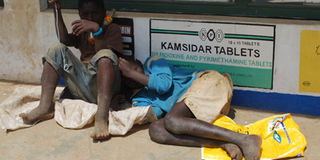Children suffer violence most, says report

Stranded. Street children on a street in Mbarara Town recently. Many children flee their homes due to violence and start living on the streets. PHOTO BY RAJAB MUKOMBOZI
What you need to know:
- Percentage. Research indicates that 35 per cent of females and 17 per cent of males experienced sexual violence in their childhood.
MBARARA.
There is rampant sexual, physical and emotional violence against children in Uganda, a new study has revealed.
The research carried out in 2016 in 112 districts indicates that 35 per cent of females and 17 per cent of males experienced sexual violence in their childhood.
The study has also revealed that 59 per cent of females and 68 per cent of males experienced physical violence while 34 per cent of females and 36 per cent of males experienced emotional violence.
In the violence against children survey (VACS), Ugandan adolescents and young adults between ages of 13 to 17 and 18 to 24 were asked about their experiences with violence.
The latter age group shared their experience with sexual violence before age 18.
The research findings released on November 8 in Mbarara indicated that neighbours, intimate partners, friends, classmates and strangers are the most perpetrators of sexual violence.
Authority figures and family members rank low in sexual violence against children. The study further says most of the cases of sexual violence take place at victims’ homes, school, on the road and perpetrators’ homes.
The abuse was found to be taking place mainly in the evening and afternoon for both females and males.
Parents, adult care givers, adults in community, peers and teachers are the major perpetrators of physical violence against children. The research shows that many children who experienced violence had low awareness of where they could seek help.
Mr Fred Lukabwe, who represented the commissioner for children and youth affairs in the Ministry of Gender, Labour and Social Development (MoGLSD), described the findings as alarming and annoying.
MoGLSD was the lead agency in the survey in close collaboration with Unicef Uganda, Centre for Disease Control and USAID.
“These findings are alarming and annoying. I am saddened by the findings and something has to be done now and not any other time. The children are the future of this country and we have to end this violence now,” said Mr Lukabwe.
He added that the ministry would disseminate the findings and make recommendations to government and come up with workable solutions.
Mr Lukabwe further said: “We have laws against violence against children, but its implementation has been a challenge, the society looks at government but issues to do with children need all stakeholders, it’s you and me.”
The Mbarara District education officer, Mr Gabriel Ahimbisibwe, said whereas they are laws protecting children, they are not adequately implemented.
He added that years back the issue of street kids used to be heard only in Kampala but they are now in all towns, which he said is manifestation of increasing abuse of children, forcing them to flee to the streets.
Africhild Country Director Joyce Wanican said the country can’t have bright future when children live under violence.
“The future of the country is not only in having good roads, hospitals and schools, but how much it has invested in its children, a country will be going nowhere if it does not priotise early childhood development and foundation,” said Ms Wanican.
The research outlines seven strategies to end violence against children: implementation and enforcement of laws, norms and value change, safe environments, parental and caregiver support, income and economic strengthening, response and support services, and education and life skills.


